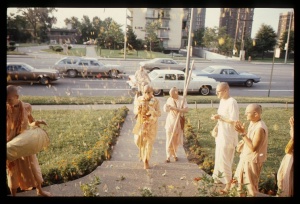SB 10.53.18-19

A.C. Bhaktivedanta Swami Prabhupada
Please note: The synonyms, translation and purport of this verse were composed by disciples of Śrīla Prabhupāda
TEXTS 18-19
- kṛṣṇa-rāma-dviṣo yattāḥ
- kanyāṁ caidyāya sādhitum
- yady āgatya haret kṛṣno
- rāmādyair yadubhir vṛtaḥ
- yotsyāmaḥ saṁhatās tena
- iti niścita-mānasāḥ
- ājagmur bhū-bhujaḥ sarve
- samagra-bala-vāhanāḥ
SYNONYMS
kṛṣṇa-rāma-dviṣaḥ — those hateful toward Kṛṣṇa and Balarāma; yattāḥ — prepared; kanyām — the bride; caidyāya — for Śiśupāla; sādhitum — in order to secure; yadi — if; āgatya — coming; haret — should steal; kṛṣṇaḥ — Kṛṣṇa; rāma — by Balarāma; ādyaiḥ — and other; yadubhiḥ — Yadus; vṛtaḥ — accompanied; yotsyāmaḥ — we will fight; saṁhatāḥ — joining all together; tena — with Him; iti — thus; niścita-mānasāḥ — having decided; ājagmuḥ — came; bhū-bhujaḥ — the kings; sarve — all; samagra — complete; bala — with military forces; vāhanāḥ — and conveyances.
Translation and purport composed by disciples of Śrīla Prabhupāda
TRANSLATION
To secure the bride for Śiśupāla, the kings who envied Kṛṣṇa and Balarāma came to the following decision among themselves: "If Kṛṣṇa comes here with Balarāma and the other Yadus to steal the bride, we shall band together and fight Him." Thus those envious kings went to the wedding with their entire armies and a full complement of military conveyances.
PURPORT
The word saṁhatāḥ, which normally means "bound tightly together," may also mean "thoroughly struck down" or "killed." Thus although Kṛṣṇa's enemies thought they were unified and strong—saṁhatāḥ in the former sense—they could not successfully oppose the Personality of Godhead, and consequently they would be struck down and killed—saṁhatāḥ in the latter sense.